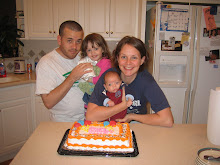Looks like Reid might be coming home next week! As I've stated before, this is very exciting for us, but also very nerve wracking! We did find out that Reid will definitely be coming home with an apnea monitor. This is more of a precautionary measure and will monitor his heart rate. If his heart rate drops below 100 bpm (bradycardia), a loud alarm will sound. Hopefully we will never hear that alarm! For a definition of bradycardia and all that goes along with it, scroll to the bottom of this blog. Dr. Ahmed did look back at Reid's chart and he hasn't had a single bradycardia episode documented for 6 days! Originally the thought of bringing Reid home with a monitor was scary; now I think it would be twice as scary not to have one! I could just picture myself and Jimmy standing over Reid all night just to make sure he was breathing. Dr. Ahmed is doing everything he can to get Reid off of oxygen before he comes home. He has been on very little oxygen the last few days; he seems to need it most when he is feeding. If he does come home on oxygen, it will only be for a very short time. Speaking of feeding, our little man is taking almost all of his feeds on his own! The feeding tube is only used when he is just too tired to eat - the nurses say it's the lazy man's way of getting full! I gave Reid a bottle today and he ate all 40 cc's in about 30 minutes! He has made such progress in the last few weeks. He is now 4 pounds, 8 ounces - almost double his birth weight! ********************** A little info on bradycardia and apnea in preemies (copied from a University website):
|
What is apnea? Apnea is a pause in breathing that has one or more of the following characteristics:
What is bradycardia? Bradycardia is a slowing of the heart rate, usually to less than 100 beats per minute for a premature baby. Bradycardia often follows apnea or periods of very shallow breathing. What is desaturation? A decrease in the percentage of oxygen found in the circulating blood supply. In premature infants a saturation below 85 is considered below normal. In most infants, oxygen is adjusted to keep the oxygen saturation 92-96%. **Shari's Note: this is where Jameson ran into major problems - his oxygen level never rose about 20%, even with the ventilator. Why do premature babies have apnea? Premature babies have immature respiratory centers in the brain that "forget" to tell the baby to breathe. Premature infants normally have bursts of big breaths followed by periods of shallow breathing or pauses. Apnea is most common when the baby is sleeping. Will apnea of prematurity go away? As your baby gets older, his/her breathing will become more regular. The time course is variable. Usually apnea of prematurity markedly improves or goes away by the time the baby nears his/her due date. Shari's Note: Reid's actual due date was supposed to be October 4th. Once apnea goes away, will it come back? No, if the apnea is a result of immaturity. Once a baby matures and the apnea resolves, it will not return. If a baby should have breathing pauses after apnea goes away, it is not apnea of prematurity. It is due to some other problem and needs to be discussed with your baby's physician. This is very uncommon. |













